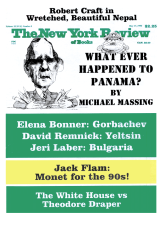The following, by one of Bulgaria’s leading poets, was written before the fall of Todor Zhivkov last autumn.
I know that my home is electronically wired.
I cannot count on the installation breaking down from time to time as any other Bulgarian-made installation would. This eavesdropping system is imported, Japanese, top of the line. Bulgaria is a rich country—it has more than enough wealth to throw away hard currency on such inventions of the contemporary super-genius of evil.
And so it is. I know all that. I am an “eavesdropped” person. I am gradually turning from homo loquens (speaking man) to homo ludens (playing man). What games do I play? I play at blindman’s bluff with gestures, drawing the most fantastic curlicues and patterns. My husband and I have a well-perfected sign language. We understand each other with half a gesture. This creates a special closeness between us, closeness of which many couples in a free country couldn’t even dream. Every day, every hour, I have an opportunity to admire the ingenuity of my husband, his witty air-aphorisms, his gift of gesture, much more expressive than the trivial gift of gab.
The ritual of our morning coffee is more elaborate than a Japanese tea ceremony. In silent tête-à-tête we exchange hints and clues with elegant ballet figures of the hands, and often of the whole body. In this pantomime we also include objects around the house. When a new word is needed, for which we haven’t made up a new hieroglyph in the air, we come very close to each other and my husband whispers in my ear the dangerous word, quite like people in love on their first date. And I answer with a mysterious smile full of understanding.
And our nights are even more intimately warm. In the dark we use Braille. I take his hand and on his palm write warnings, reminders, questions with my fingers. Or we confide to each other something very secret with inarticulate speech. Sometimes we have longer midnight dialogues. Then we use a different language, Samskrit, with newly coined words, understood only by ourselves and no one else in the world.
If this night-whispering sinks into deeper, more dangerous subjects, we bury our lips in each other’s ears more and more often; we do this under the covers. There, as under water, a part of the weight of reality is lost. But if we strike a mine—some absolute taboo, which could cost us our lives—to deceive our eavesdroppers, we shout at the top of our voices: “The day went quite well! We worked with enthusiasm! Good night! Sweet Dreams!” And we fall asleep, our heads next to each other, happy that in the dark we understand each other with half a breath. And we dream that we enunciate our thoughts articulately and loudly. And horrified, we are jolted awake from this nightmare.
—Blaga Dimitrova
—Translated from the Bulgarian by Ludmilla Popova-Wightman
This Issue
May 17, 1990



